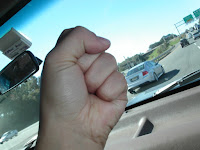A blog has been shared around the past couple of days, from the Australian site Happy Families Family Education blog. The link is here... The title is
18 ways to a more resilient childIt is fiction.
There are not 'ways' to 'a more resilient child' ... because children are not resilient. See Dr. Bruce Perry: Children are not resilient, children are malleable...
Seek not to make a resilient child, but a loved and cherished child.
There is some not-terrible general parenting advice in the piece... although I would re-write every single point (in grey), thus (in blue):
1. Stop saying “I’m busy1. Stop being 'too busy' doing what you don't think is important and do what you think is important
There is an old quote that “To a child, LOVE is spelled T-I-M-E.” If that is the case, I can’t help but wonder what “Hurry up” might mean to a child. Or “I’m too busy right now.”When we are too busy for our children, or when we are rushing them, they suffer. They withdraw. They miss out on opportunities to connect with us. And when they are older, our relationship with them will suffer.
What we do with our time demonstrates our true priorities. Is it the newspaper, other people, the computer game, the tv show -–or the people in your life? Prove it.
2. Turn off your smartphone2. Use the technology intentionally, not incidentally
There may be no greater sign that you care, and that you will listen, than to power down your phone – or at least go to flight mode – when your children want your attention. Studies show, definitively, that the mere presence of a phone detracts from the quality of our conversations. Put the phone away when you are talking.
Do what is genuinely important to you: is it cruising through fb and instagram 80 times a day, or the people in your life? Prove it.
3. Turn off screens3. Use the technology intentionally, not incidentally
Make certain parts of the day screen-free. No TV. No tablets. No phones. Just a focus on the people in front of you. That means no texting, reading, swiping, or playing games. It means no beeps, pings, whistles, or reminders. It’s just you and your kids, and conversation. Perhaps it might be at meal time. Maybe it could be while you travel. When you decide to do it is less important than making the decision.
Do what is genuinely important to you with your time and attention: is it the tv show, news, sports or the people in your life? Prove it.
4. Make eye contact4. Sure. Also: watch their eyes as they are busy doing their own thing
When your children want to connect and communicate with you, pause what you are doing and look them in the eyes. Physically turn towards them and pay attention to them in a way that makes it clear to them you really are right there.
When they look up, they'll see you watching and feel connected without you having to do children's activities to 'be together.'
5. Listen5. Listen to them to understand them, not to tell them things
Sometimes our children come to us with problems. When they do, put down your tools and listen! When they tell you about a friendship drama, a challenge on the netball team, a teacher making them feel rotten, or another difficulty, ask them to tell you all about it. Listen carefully. When they are finished, ask, “What do you think you should do?” and listen again. Usually that’s enough. You don’t have to solve their problems. The answers are inside them.
Don't ask questions. Say 'tell me more about that...' until they have finished talking. Rephrase what they've shared, with the emotions they're experiencing, as 'you feel _____ because_____.' Don't add interpretation, advice, information, your own reaction, how you felt when stories or justification for others' behaviour.
6. Bed time is best6. Be available as they need you throughout the day (and night) –no time is 'best' except 'when they need you'
I have written previously about how to make the last ten minutes of the day a precious bonding time with your children. Try it. Our children need to go to sleep feeling secure, loved, and hopeful about the day to come.
Children need what they need when they need it. There is no reason to withhold it (unless there isn't any of what they need available) ever, and certainly not to wait for any specific time.
7. Give hugs, and touch them7. Touch them if they are okay with it: their body, their choice; be open to their physical affection
In our home, we have a habit of always touching one another as we move past one another. It might be a squeeze on the arm, a stroke of the hair, a caress on the cheek, or an arm across the shoulder. The touch is an acknowledgement that you are passing a real person. It is a recognition that you have seen and noticed your child (or spouse). And it feels nice to be noticed. Plus, research shows it can boost wellbeing.I also find that if a child is struggling, one of the best things we can do is hug them. In fact, the times our children deserve our hugs the least are the times they need them most.
Get your own need for physical touch met elsewhere. Your job with kids is to be available to meet their needs, not yours.
8. Stay calm8. Learn to calm yourself
I once heard Steve Biddulph say that a parents’ main job is to stay calmer than their child. When we stay calm, our children learn to regulate their behaviour. They learn we are stable, secure, predictable, and safe. They learn that they can come to us no matter what, and we will respond calmly and kindly.
Panicking people can't calm others. Be the stable person in the room. If you can't, they won't be able to, either.
9. One on one time is crucial9. One-on-one time is irrelevant and may be deeply distressing to sensitive children (and adults)
I have six children (and one wife!) who all want time with me. Our children feel important, heard, and worthy when they have our undivided attention. Outings, walks, and other forms of one-on-one time may be the most important way we can show our children we care about them and want to listen to them. These ‘dates’ can be crucial relationship builders, and we will see our relationships strengthen as we make them a priority.
Having to set aside (or make invisible) other people to get one's needs met is pathological, and it is often distressing to children to think that someone else needs to cease to exist (or at least cease needing anything from their parents) in order to have their needs met. It really is possible to pay full attention to one person with witnesses.
10. Smile10. Be genuine and own your emotions
Let’s face it: most parents are so busy and so stressed that we do not smile as much as we might. But a smile says we can feel safe, and welcome. Our children need to see us smiling, especially at them.
If you think you can stop children from knowing and reacting to your genuine emotions by smiling, you're high. Smile when you feel happy. Grimace when you are in pain. Scowl when you are angry. Weep when you are sad. Kids don't learn to handle their big emotions from Stepford Wives.
11. Make time to do nothing11. Prioritize being with the people you claim to love
When was the last time you simply sat in your lounge room with no agenda except to be there? Our children are most likely to talk to us when they feel conversation is welcome. If our schedule is packed so tightly we cannot even find time for a conversation with our children, we cannot make them feel cared for or listened to. Sometimes simply sitting and being available can be enough to help our children know we will listen.
Not to do planned things, necessarily –but also not to avoid planned activities. Be flexible and available as they need. Be unhurried and be willing to drop activities if they're unwanted (this time, or forever) regardless of the sunk cost or 'lessons in commitment' others might think matter.
12. Respond to challenging behaviour with maturity12. Be the adult: demonstrate grace and acceptance, listening and understanding
It is common to respond to our children’s challenging behaviour with anger. This will invariably leave a child feeling uncared for and unheard. Sometimes we ignore our children. This has similar results. When we remember that challenging behaviour comes from unmet needs, and we see that challenging behaviour as a chance to get close to our children and problem-solve with them, we build our relationships rather than tear them down. Remember that discipline means teach or instruct, not hurt or punish.
Kids often act out their big feelings, so responding to actions with anger or as if they were driven by malice is inappropriate. When kids are struggling, they don't need more trouble, and they don't need to learn that you are the person who gets them into trouble, not out of it.
13. Leave love notes13. Be affectionate in your own way, with awareness of how your child experiences affection
You might shoot your child a text or facebook message. Perhaps you could drop a note into his or her lunchbox, or pop a quick letter under his pillow. Children love getting notes from mum or dad. They feel noticed, important, acknowledged, valued.
Whatever your love language is, use it –but also use your kids' love languages for them. Even if you think doing things for them is love, they might feel gifts or time or words of affection or physical touch are the only way they feel loved. Don't stop doing the things that make you feel loving, just add the things that make them feel loved.
14. Offer autonomy14. Acknowledge their autonomy
Our children feel unloved when we control them. They chafe and resist our stifling demands. While we do need to have rules and limits, our children will thrive, feeling heard and cared for, when we give them choices and allow them to decide for themselves wherever possible.
Their body, their choice. Their possessions, their choice. Their preferences, their choice. Recognize the separateness of this human. This is not 'your' person, they all belong to themselves.
15. Get down on the floor with them and play15. Get down on their level and interact
Children love it when a parent lets the agenda go and flops down on the floor for some playtime. They flourish downtime with their parents where they can play, laugh and be together. Older children love wrestling too! But they respond just as well to those old-school games like Uno, Phase 10, or Skip-Bo. And they love it when we jump on the trampoline, have Nerf-gun wars, or play handball or skipping.
Play if that winds your watch, but just be alongside their activities without any agenda of your own. Take what they hand to you, give back what they want back, talk about what they're doing, listen to their imaginary stories, don't direct them or add to the stories. Be neutral in your observations, just like a good sportscaster: say what you see, notice their development and skills improvement, recognize their attempts...
16. Save their presents16. Do not be an example of hoarding
There is something precious and heart warming about going back through all of the hand-made mothers or fathers day cards, birthday cards, and Christmas cards our children give us. Show them that you treasure their thoughtfulness and kind gifts. My great-grandmother kept a pottery ‘thing’ I made on her shelf for over a decade until she passed away. I saw it every time I visited and marvelled that she kept it on display. I felt like she loved me because she loved the gift.
Teach gratitude and generosity by being grateful and generous. Keep the treasures you treasure, and thank them for the treasures you discard when the gift has served its purpose. Teach sharing by donating unneeded things to others.
17. Tell them you love them17. Express your genuine emotions
They need to hear those three words often.
When you feel loving, tell them you love them. When you feel tired, tell them you're tired. Be real.
18. Show them you love them18. Demonstrate your life priorities in your choices of how you spend your time and energy
More than the words, they need to feel you love them. Show them as much as you can. They will grow up resilient, because they will grow up feeling cared for and listened to.
Spend your time on what is genuinely important to you: friends, others, cars, tv shows, globetrotting, work... or the people you love.
Children are not, and cannot become, resilient. They are deeply affected by harsh treatment, chronic stress and trauma. They are healed by loving and nurturing care.
The goals isn't resiliency anyhow, it's mental health and well-being...


















